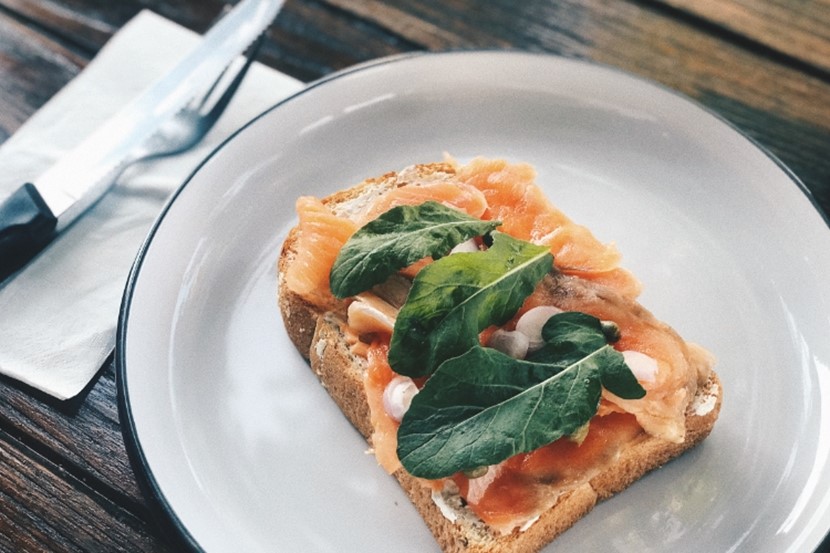Can you eat salmon during pregnancy?

When it comes to what to eat, and what not to eat during pregnancy, there are a number of conflicting messages, particularly when it comes to seafood. Regal Salmon clarifies the do's and don'ts of eating salmon while pregnant. And...keep reading for a delicious and safe salmon meal from the lovely Nadia Lim!
Why salmon is good for you!
Salmon is a naturally rich source of long chain omega-3s. DHA (one of the long chain omega-3s) is vital for the development of the growing baby’s brain, eyes and nervous system. In high risk pregnancies, a higher intake of DHA has also been shown to reduce the risk of premature births (less than 34 weeks).
If dietary intake of long chain omega-3s during pregnancy is inadequate, the omega-3s will be drawn from the mother’s own supply which depletes her levels. Research has shown this can lead to an increased risk of post natal depression.
As well as an omega-3 source, salmon also provides excellent levels of protein, minerals, vitamin B12 and iodine. It is also low in saturated fat. All these are important considerations during pregnancy.
WHEN
To achieve adequate DHA intake, pregnant and breastfeeding women should aim to consume at least 200mg DHA per day – this is equivalent to 1 to 2 oily fish meals a week (such as salmon or sardines).
HOW
To be safe, eat freshly cooked seafood. Make sure it is eaten immediately and any leftovers are stored in the fridge and used within a day of cooking.
Avoid chilled seafood, whether it’s raw (e.g. sushi or sashimi) or smoked ready-to-eat product. This is because it is at higher risk of harbouring listeria and during pregnancy both mother and unborn baby are at a higher risk of contracting the dangerous listeriosis.
| Commonly quoted: | True/False | Why |
|
You shouldn’t eat any fish when you’re pregnant |
False | Fish is an important source of many vital nutrients during pregnancy |
| You can’t eat raw salmon in sushi when you’re pregnant | True | It is advised to avoid all raw fish during pregnancy as it is a higher risk food |
| Fish is too high in mercury for you to eat when you’re pregnant | True in some cases | Some fish are particularly high in mercury so their intake should be severely limited. The seafood included in this category are Orange Roughy, Catfish, Shark and Billfish. |
|
NADIA LIM'S PAN-FRIED REGAL SALMON WITH SALSA VERDE, FONDANT POTATOES Difficulty: Easy INGREDIENTS FONDANT POTATOES SALMON AND SALSA VERDE
METHOD Preheat oven to 220°C. Arrange potatoes in a single layer in a large baking or casserole dish so that they fit snugly. Pour over chicken stock (note: if you are using fresh unsalted chicken stock, season with salt). Sprinkle over rosemary or thyme and dot with butter. Bake, uncovered, for 30-35 minutes until potatoes are golden and almost all of the stock has been absorbed. While the potatoes are cooking, make the salsa verde and the salad. Thinly slice the apple, and then cut into thin matchsticks. Place in a bowl and squeeze over lemon juice to prevent browning. Mix mayonnaise / crème fraiche / yoghurt with Dijon mustard and orange juice and set aside. About 10 minutes before the potatoes have finished cooking, cook the salmon. Season both sides of salmon with salt. Heat a drizzle of olive oil in a large fry pan on medium to high heat. Pan-fry salmon, skin-side-down, for 2 minutes until skin is nice and crispy, then flip over and continue to cook for 1 more minute until salmon is just cooked through (salmon is best cooked medium). Gently toss apple, fennel and watercress together. To serve, place some fondant potatoes and a piece of salmon on each plate. Spoon some salsa verde over the salmon. Serve with apple and watercress on the side and dress with creamy dressing. Salsa verde Place all ingredients in the blender, season with salt and pepper and process until well combined. Makes about 1 cup. Keeps in the fridge for up to 1 week. |
About New Zealand King Salmon
New Zealand King Salmon (NZKS) sustainably farms King salmon from five sea farms in the cool, deep waters of the South Island’s Marlborough Sounds. NZKS invests heavily in research and development and is recognised worldwide for its best in class King salmon farming practises. It is firmly committed to the sustainability and viability of a renewable resource with its success centred on maintaining the quality of the waters in which the salmon are farmed. To this end, NZ King Salmon is independently certified by the Global Aquaculture Alliance as conforming to its Best Aquaculture Practices standards. Compared to other salmon and seafood species, King salmon consistently contains some of the highest levels per serving of healthy long-chain Omega-3 oils. The health benefits of Omega-3 oils are widely recognised by health professionals.

